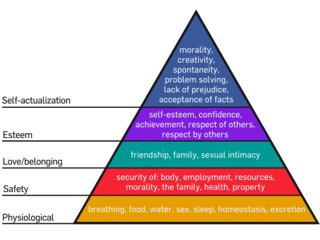 As humans, there are a variety of needs that we must fulfill to sustain our existence. Abraham Maslow developed a pyramid called a "hierarchy of needs," which categorized those needs and ranked them in order that people would pursue them. For example, looking at the pyramid to your left, one would not seek to fulfill needs of safety like security or property, without first meeting the physiological needs. What does all of this have to do with the book I'm reviewing today? I believe a large portion of the laity in the Church have climbed to the third tier of the pyramid and are seeking a sense of belonging and purpose in the Catholic Church. Cardinal Arinze addresses these needs in his latest book The Layperson's Distinctive Role.
As humans, there are a variety of needs that we must fulfill to sustain our existence. Abraham Maslow developed a pyramid called a "hierarchy of needs," which categorized those needs and ranked them in order that people would pursue them. For example, looking at the pyramid to your left, one would not seek to fulfill needs of safety like security or property, without first meeting the physiological needs. What does all of this have to do with the book I'm reviewing today? I believe a large portion of the laity in the Church have climbed to the third tier of the pyramid and are seeking a sense of belonging and purpose in the Catholic Church. Cardinal Arinze addresses these needs in his latest book The Layperson's Distinctive Role.
The Layperson's Distinctive Role is more than just an explanation of the laity's role in the Church. It is a call to embrace that role. But what exactly is the role of the layperson? For the longest time, laity in the Catholic Church served three purposes - to pray, to pay, and to obey. That means they were asked to go to Mass, pay their tithes, and obey what the clergy said no questions asked. Priests and other religious were in charge of everything else. Pope John XXIII, in his infinite wisdom, helped change that with Vatican II. In this council, specifically in the two documents Lumen Gentium and Apostolicam Actuositatem, the role of the laity was defined and a charge was given to them to accept their lay vocation and become co-participants in the mission of evangelization.
The first chapter of this book starts off with a charge to all baptized Christians to participate in evangelization. The author then explains what constitutes the laity and provides a bit of history on the nature of lay evangelization in the New Testament, with examples such as Mary Magdalene or the Samaritan woman at the well. We then learn about various forms of lay apostolate, primarily Catholic Action. Then, we get to the meat of the book with Chapter 5 - "The Specific Role of the Laity." This chapter explains the contents of important Church documents (including the two listed above). However, Cardinal Arinze simplifies the call of the laity by saying that our role is to let God fill every aspect of our life. We can't compartmentalize our faith and only take it seriously on Sunday. We must be witnesses to our faith in our job, our everyday life, and in everything we do. The rest of the book then goes on to discuss how laity and clergy can work in unison and how the lay ecclesiastical movement is present today, like the charismatic renewal.
The days are gone where we as laity can make excuses or say things like, "I wish my Church had this activity." If you feel like your Church would benefit from something like a Bible Study or Young Adult Group, ask your priest's permission to start one. Don't ask them to start one for you. I can almost guarantee that they will welcome the opportunity for more parishioner involvement. So if you are a layperson trying to find your place in the Church, then The Layperson's Distinctive Role is the book for you. If you are part of the clergy and are looking for ways directions to steer your flock or ways to encourage your flock to get involved, you too will benefit from this book. What I'm saying is that any Catholic would benefit greatly from reading this book. I hope that I can apply its lessons more to my daily life at my job and let my life be a witness in my work.
Order The Layperson's Distinctive Role and support CatholicMom.com with your purchase
Copyright 2013 Stuart Dunn
About the Author

Stuart Dunn
Stuart Dunn was born and raised in Mobile, AL and received a Bachelor of Arts in Psychology and a Master of Business Administration from the University of South Alabama. Stuart reviews all things Catholic including adult books, children’s books, Bible Study series, Catholic Courses, CDs, and DVDs in addition to board games at his blog Stuart’s Study at StuartsStudy.blogspot.com.



.png?width=1806&height=731&name=CatholicMom_hcfm_logo1_pos_871c_2728c%20(002).png)
Comments